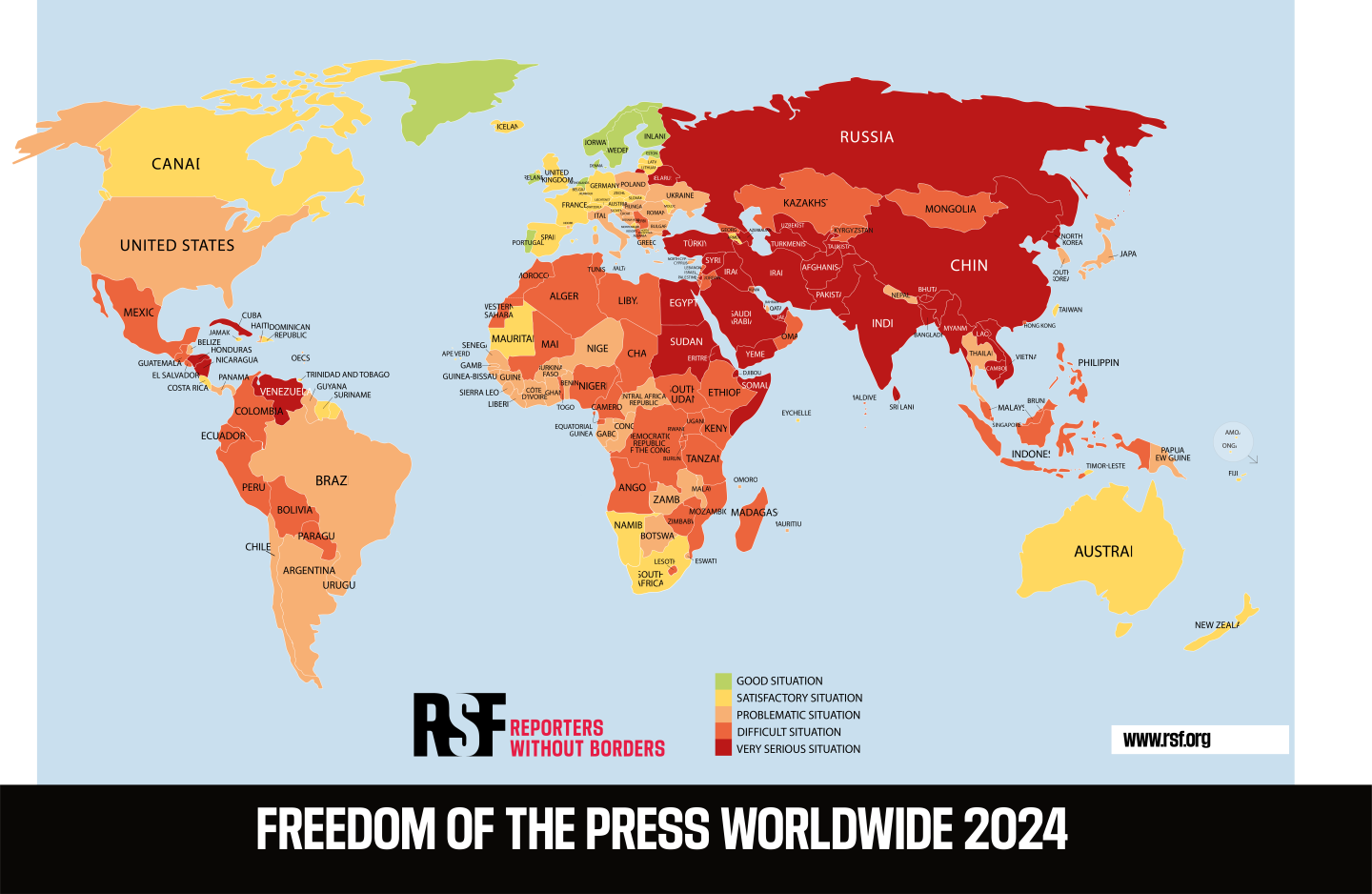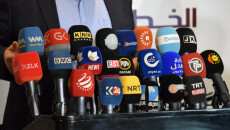Press freedom in Iraq and the Iraqi Kurdistan Region IKR is deteriorating due to continued violations, including arbitrary detention and “unfair” trials of journalists.
Iraq ranks 169th out of 180 countries in the world, according to the latest ranking of countries for press freedom, released by Reporters Without Borders on May 3, World Press Freedom Day.
Freedom of expression is retreating in Iraq which ranked 167th last year, mounting pressure from international press freedom organizations on the authorities in Baghdad and Erbil.
“Between terrorism, political instability and protests, journalists face threats from all sides and come up against the weakness of the state, which is failing in its duty to protect them,” says Reporters Without Borders about Iraq.
In its latest report, Amnesty International says authorities of the Kurdistan Region of Iraq (KR-I) “must end their assault on the right to freedom of expression and press freedom, including the arbitrary detention, beating and grossly unfair trials of journalists.”
“The harassment, intimidation and attacks against journalists have had a chilling effect on the right to freedom of expression and press freedom in the KR-I, with many journalists forced to flee or go into hiding or give up journalism altogether while many others remain in jail.”
The KR-I authorities boast that the Region is a beacopn for press freedom, but that is a ludicrous claim given their crackdown on press freedom, Bissan Fakih, Amnesty International’s Iraq Campaigner
“The KR-I authorities boast that the Region is a ‘beacon of press freedom’, but that is a ludicrous claim given their crackdown on press freedom and the harassment, intimidation and prosecution of journalists, especially those who have reported on allegations of corruption and criticized authorities’ handling of social issues,” said Bissan Fakih, Amnesty International’s Iraq Campaigner.
“The authorities’ assault on press freedoms has created a culture of fear engineered to stifle peaceful dissent and perpetuate impunity,” Fakih added.
In the first three months of 2024, according to Amnesty International’s documentation, the KR-I authorities have detained or summoned at least 10 journalists in relation to their journalism work. Others are already serving prison sentences after grossly unfair trials.
Almost 250 violations have been registered against journalists in the Iraqi Kurdistan Region IKR last year, according to the Metro Center for the Protection of Journalists' Rights.
According to Metro statistics, the 249 violations were committed against 247 journalists, including 134 cases of obstruction and discrimination, 38 cases of confiscation of journalistic equipment, 37 cases of detention without a court order, 27 cases of attacks, threats and insults.

From May 3, 2023 to May 2, 2024, over 330 violations were recorded in Iraq, including arrests, injuries, armed attacks, obstruction, beatings and lawsuits against journalists, according to the Press Freedom Advocacy Association in Iraq.
Baghdad topped the list, followed by Erbil and Basra, then Kirkuk with 27 violations, Nineveh with 32, Diyala with two and Salahaddin with one case.
In its report, Amnesty International spoke to eight journalists and relatives of detained journalists and their lawyers, and reviewed court documents pertaining to four cases against detained journalists in the KR-I, all of whom spoke about the obstacles to freedom of the press in the semi-autonomous region.
Amnesty International cited case of Journalist Qahraman Shukri who is currently serving a seven-year prison sentence “following a grossly unfair and secret trial. Before his arrest, he was critical of the Kurdish authorities’ handling of Turkish air strikes in the KR-I.”
His brother, Zeravan Shukri, told Amnesty International that in January 2021, “the Asayish, the KR-I government’s primary security and intelligence agency, violently arrested Qahraman during a raid in which they knocked down the main door to his house in the Duhok governorate and dragged him out of bed.”
Qahraman Shukri was forcibly disappeared for four months, until his family received a phone call from a member of the Asayish informing them that he was being detained at Zerka Prison in Duhok, Amnesty International says.
When his family visited him for the first time in May 2021, Qahraman told them that security forces “beat him until he confessed to crimes that he did not commit.”
“He was scared and wanted to make the beatings stop,” his brother told Amnesty Internationl.
Qahraman also told them he did not have legal representation during his interrogations. The family also said that they did not know Qahraman had been charged and tried until after the sentencing when they were allowed to visit him.

Court documents reviewed by Amnesty International revealed that the Duhok Criminal Court convicted him of “joining and spying for the Kurdistan Workers’ Party (PKK) and sharing material with them.”
He was not permitted to select a lawyer of his own choice for the trial nor given adequate time to prepare a defense. Qahraman told his brother he was unaware of the trial until he was transported suddenly in a security vehicle to the Duhok Criminal Court.
On 12 October 2023, the Court of Cassation upheld his conviction and sentence even after Shukri told the judges that his “confessions” were extracted under duress.
“From the moment of his arrest Qahraman Shukri’s basic rights including his right to a fair trial have been flagrantly violated – he was beaten, forced to confess, denied access to a lawyer,” said Bissan Fakih.
Shukri’s brother, also a journalist, told Amnesty International he has received multiple threats telling him to “keep his mouth shut” for advocating on behalf of his brother’s release.
“I left [Kurdistan] to protect my family because they lived in constant fear that I was also going to be arrested,” the brother said.
The KRG should immediately and unconditionally release all those detained solely for their journalistic work, Bissan Fakih, Amnesty International’s Iraq Campaigner
There are several other cases that have not been resolved, including the arrest of journalist Sulaiman Ahmad, who has been in prison for several months and his fate remains unknown.
Sulaiman Ahmad, who worked as a reporter for the Arabic department of Rojnews, was arrested and disappeared on October 25, 2023 while returning to the KRI from Syria.
While a number of journalists have been prosecuted and sentenced to lengthy prison terms, in the majority of cases, the authorities have subjected journalists to harassment and intimidation, silencing critical voices. Amnesty International is aware of at least eight journalists who have fled the KR-I in the past four years fearing for their safety. Many of them worked in outlets that were perceived to be critical of the authorities and covered issues of alleged corruption in the KRG.
The journalistic working environment is not healthy according to statistics. There have been at least four cases of murder of journalists in the past decade and the main killer has gone unpunished. Several journalists have also been punished in violation of the journalism law and charged with "espionage and corruption.”
Amnesty International calls for the immediate and unconditional release of all detainees detained solely for journalistic work.
“No one should face harassment and intimidation simply for carrying out their journalistic work,” Fakih said.
“The KRG should immediately and unconditionally release all those detained solely for their journalistic work. Authorities should uphold human rights and press freedom and take credible steps to create a conducive environment where journalists can carry out their work safely and people are allowed to express critical opinions freely.”






